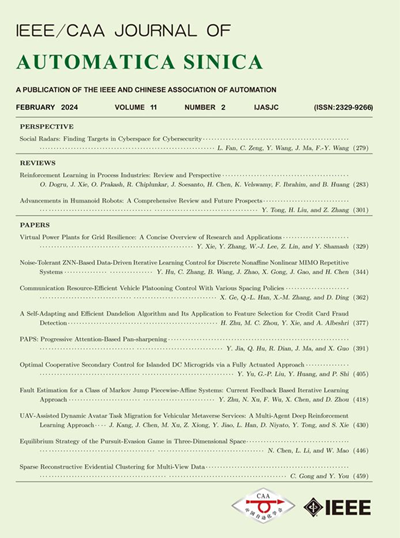比例积分控制器增强的非负潜因子分析模型
IF 19.2
1区 计算机科学
Q1 AUTOMATION & CONTROL SYSTEMS
引用次数: 0
摘要
通过单潜因子依赖、非负乘法更新(SLF-NMU)算法,可以高效地构建非负潜因子(NLF)模型,对多种大数据相关应用中的高维不完整(HDI)矩阵进行精确表示。然而,SLF-NMU算法仅依靠当前更新增量更新潜在因子,而不考虑过去的学习信息,使得最终模型收敛缓慢。针对这一问题,本文提出了一种比例积分(PI)控制器增强NLF (PI-NLF)模型,该模型具有两方面的思想:1)设计增量细化(IR)机制,将当前和过去的更新增量作为PI控制器的比例和积分项,从而高效地将过去的更新信息平稳地吸收到学习方案中;2)推导了基于IR的SLF-NMU (ISN)算法,该算法遵循IR机制的原理更新潜在因子,从而显著加快了NLF模型的收敛速度。实际应用中收集的8个HDI矩阵的仿真结果验证了PI-NLF模型在估计HDI矩阵中缺失数据时的计算效率和精度优于几种前沿模型。所提出的PI-NLF模型可以有效地应用于电子商务系统、社交网络、云服务系统等涉及HDI矩阵的应用。代码可在https://github.com/yuanyeswu/PINLF/blob/mainIPINLF-code.zip上获得。本文章由计算机程序翻译,如有差异,请以英文原文为准。
A Proportional Integral Controller-Enhanced Non-Negative Latent Factor Analysis Model
A non-negative latent factor (NLF) model is able to be built efficiently via a single latent factor-dependent, non-negative and multiplicative update (SLF-NMU) algorithm for performing precise representation to high-dimensional and incomplete (HDI) matrix from many kinds of big-data-related applications. However, an SLF-NMU algorithm updates a latent factor relying on the current update increment only without considering past learning information, making a resultant model suffer from slow convergence. To address this issue, this study proposes a proportional integral (PI) controller-enhanced NLF (PI-NLF) model with two-fold ideas: 1) Designing an increment refinement (IR) mechanism, which formulates the current and past update increments as the proportional and integral terms of a PI controller, thereby assimilating the past update information into the learning scheme smoothly with high efficiency; 2) Deriving an IR-based SLF-NMU (ISN) algorithm, which updates a latent factor following the principle of an IR mechanism, thus significantly accelerating an NLF model's convergence rate. The simulation results on eight HDI matrices collected by real applications validate that a PI-NLF model outstrips several leading-edge models in both computational efficiency and accuracy when estimating missing data within an HDI matrix. The proposed PI-NLF model can be effectively applied to applications involving HDI matrix like e-commerce system, social network, and cloud service system. The code is available at https://github.com/yuanyeswu/PINLF/blob/mainIPINLF-code.zip.
求助全文
通过发布文献求助,成功后即可免费获取论文全文。
去求助
来源期刊

Ieee-Caa Journal of Automatica Sinica
Engineering-Control and Systems Engineering
CiteScore
23.50
自引率
11.00%
发文量
880
期刊介绍:
The IEEE/CAA Journal of Automatica Sinica is a reputable journal that publishes high-quality papers in English on original theoretical/experimental research and development in the field of automation. The journal covers a wide range of topics including automatic control, artificial intelligence and intelligent control, systems theory and engineering, pattern recognition and intelligent systems, automation engineering and applications, information processing and information systems, network-based automation, robotics, sensing and measurement, and navigation, guidance, and control.
Additionally, the journal is abstracted/indexed in several prominent databases including SCIE (Science Citation Index Expanded), EI (Engineering Index), Inspec, Scopus, SCImago, DBLP, CNKI (China National Knowledge Infrastructure), CSCD (Chinese Science Citation Database), and IEEE Xplore.
 求助内容:
求助内容: 应助结果提醒方式:
应助结果提醒方式:


